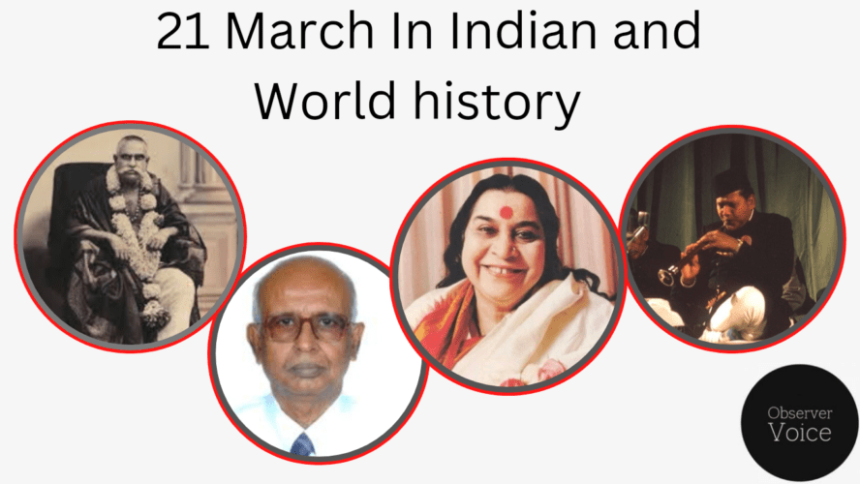March 21st holds special significance worldwide, marking various historical, cultural, and environmental events. From celebrating cultural heritage to raising awareness about global issues, this day serves as a reminder of our interconnectedness and shared experiences as humanity. Let’s delve into the rich tapestry of events and observances associated with March 21st.
1. International Day for the Elimination of Racial Discrimination:
- The United Nations designated March 21st as the International Day for the Elimination of Racial Discrimination in 1966. This observance commemorates the 1960 Sharpeville massacre in South Africa, where peaceful demonstrators protesting against apartheid were killed by police.
- The day calls for solidarity, dialogue, and actions to combat racial discrimination and promote equality among all races and ethnicities globally.
2. World Poetry Day:
- UNESCO established World Poetry Day on March 21st to celebrate the art of poetry, linguistic diversity, and cultural expressions. Poetry transcends borders, languages, and cultures, fostering creativity and dialogue among people.
- This day honors poets, encourages the writing, reading, and teaching of poetry, and highlights the importance of poetry in preserving and sharing oral traditions and histories.
3. Nowruz (Persian New Year):
- Nowruz, also known as the Persian New Year, falls on or around March 21st, marking the first day of spring and the beginning of the year in the Iranian calendar. It is a joyous celebration of renewal, growth, and the triumph of light over darkness.
- Communities across Iran, Central Asia, and parts of the Middle East celebrate Nowruz with traditional rituals, feasts, music, dance, and the setting of Haft-Seen tables adorned with symbolic items.
4. International Day of Forests:
- The United Nations designated March 21st as the International Day of Forests to raise awareness about the importance of forests for sustainable development, biodiversity conservation, and combating climate change.
- This day emphasizes the need for responsible forest management, conservation efforts, and global cooperation to protect and restore forest ecosystems for current and future generations.
Historical Events on March 21st:
1. 1960 – Sharpeville Massacre:
- On March 21st, 1960, in Sharpeville, South Africa, peaceful protesters gathered to demonstrate against apartheid’s discriminatory pass laws. The police opened fire on the crowd, killing 69 people and injuring hundreds.
- The Sharpeville massacre became a turning point in South Africa’s struggle against apartheid, galvanizing international condemnation and sparking increased activism for racial equality and human rights.
2. 1556 – Archbishop of Canterbury Thomas Cranmer Martyred:
- Thomas Cranmer, the Archbishop of Canterbury during the reign of King Henry VIII and Edward VI, was martyred on March 21st, 1556, during the reign of Queen Mary I (Mary Tudor).
- Cranmer played a significant role in the English Reformation, composing the Book of Common Prayer. However, his Protestant beliefs led to his arrest and eventual execution for heresy during Queen Mary I’s Catholic restoration.
3. 1804 – The Napoleonic Code Adopted:
- On March 21st, 1804, Napoleon Bonaparte’s legal reforms culminated in the adoption of the Napoleonic Code (Code Napoléon) in France. This civil code standardized laws related to property, individual rights, and legal procedures.
- The Napoleonic Code influenced legal systems globally and remains a cornerstone of civil law in many countries, particularly in Europe and former French colonies.
4. 1963 – Alcatraz Federal Penitentiary Closed:
- The notorious Alcatraz Federal Penitentiary, located on an island off San Francisco, officially closed on March 21st, 1963. Alcatraz gained a reputation as a maximum-security prison housing notorious criminals such as Al Capone and “Machine Gun” Kelly.
- Its closure was due to high operating costs and deteriorating facilities, leading to its eventual transition into a tourist attraction and symbol of America’s penal system.
5. 2006 – Twitter Founded:
- March 21st, 2006, marks the founding of Twitter, a social media platform that revolutionized online communication through short, real-time messages called tweets.
- Co-founders Jack Dorsey, Biz Stone, and Evan Williams launched Twitter, which has since grown into a global platform for news dissemination, social networking, and public discourse.
6. 1965 – Martin Luther King Jr. Leads Civil Rights March:
- On March 21st, 1965, civil rights leader Martin Luther King Jr. led a historic civil rights march from Selma to Montgomery, Alabama, advocating for voting rights for African Americans.
- This march, known as the Selma to Montgomery march, highlighted the ongoing struggle against racial segregation and discrimination in the United States, culminating in the Voting Rights Act later that year.
7. 1980 – On this day, US President Jimmy Carter announces a US boycott of the Moscow Summer Olympics in response to the Soviet invasion of Afghanistan.
8. 1962 – On this day, American poet and author E. E. Cummings passed away. Cummings was known for his innovative style and unconventional use of grammar and syntax in poetry.
9. 1918 – On this day, the German flying ace Manfred von Richthofen, also known as the “Red Baron,” claimed his 79th and 80th aerial victories during World War I before being shot down and killed in action on April 21st.
10. 2006 – On this day, the social media platform Twitter was launched, revolutionizing online communication through short, real-time messages known as tweets.
Conclusion: March 21st is a multifaceted day that reflects humanity’s diversity, struggles, achievements, and ongoing quest for justice and progress. From commemorating historical milestones like the Sharpeville massacre and legal reforms to celebrating cultural expressions through Nowruz and poetry, this day reminds us of the interconnectedness of global issues and the power of collective action and creativity. As we observe International Day for the Elimination of Racial Discrimination, World Poetry Day, Nowruz, and the International Day of Forests, we are called to promote equality, preserve cultural heritage, protect our environment, and strive for a more inclusive and sustainable world.
Historical Events in India on March 21st
March 21st holds significance in Indian history with notable events spanning various domains such as politics, culture, and science. Here are some key historical events in India on this special day:
1. Birth of Bhagat Singh (1907):
- One of India’s most revered revolutionary freedom fighters, Bhagat Singh, was born on March 21st, 1907, in Banga, Punjab province (now in Pakistan). Bhagat Singh’s unwavering courage, patriotism, and sacrifice during the Indian independence movement inspired generations of Indians to fight against British colonial rule.
2. Formation of the Azad Hind Fauj (1942):
- On March 21st, 1942, during World War II, Netaji Subhas Chandra Bose formally announced the establishment of the Azad Hind Fauj (Indian National Army or INA) in Singapore. The INA, under Bose’s leadership, aimed to liberate India from British rule with the support of Axis powers.
- The INA’s formation and subsequent activities played a significant role in India’s struggle for independence, igniting nationalist fervor and challenging British dominance.
3. India’s First Satellite Aryabhata Launched (1975):
- India’s journey into space exploration took a significant leap on March 21st, 1975, with the successful launch of its first satellite, Aryabhata, into orbit. Named after the ancient Indian mathematician and astronomer Aryabhata, the satellite marked India’s entry into space technology.
- The launch of Aryabhata paved the way for India’s space program, leading to remarkable achievements such as the Chandrayaan and Mangalyaan missions in later years.
4. Establishment of the Reserve Bank of India (1935):
- On March 21st, 1935, the Reserve Bank of India (RBI) was established under the Reserve Bank of India Act, 1934. The RBI, India’s central banking institution, plays a crucial role in regulating the country’s monetary policy, issuing currency, and managing foreign exchange reserves.
- Over the decades, the RBI has evolved into a key financial institution shaping India’s economic policies and fostering financial stability and growth.
5. Birth of Yogi Adityanath (1972):
- On March 21st, 1972, Yogi Adityanath, a prominent Indian politician and the current Chief Minister of Uttar Pradesh, was born in Panchur, Uttar Pradesh. Yogi Adityanath, known for his strong advocacy of Hindu nationalism and conservative policies, has been a polarizing figure in Indian politics.
6. India’s Successful Test of Prithvi Missile (1988):
- On March 21st, 1988, India conducted a successful test launch of the Prithvi surface-to-surface missile as part of its indigenous missile development program. The Prithvi missile, developed by the Defence Research and Development Organisation (DRDO), bolstered India’s defense capabilities.
- This achievement showcased India’s growing prowess in missile technology and defense research, contributing to the country’s strategic deterrence capabilities.
7. Inauguration of Jallianwala Bagh Memorial (1961):
- On March 21st, 1961, the Jallianwala Bagh memorial was inaugurated in Amritsar, Punjab, to commemorate the victims of the Jallianwala Bagh massacre of April 13th, 1919. The massacre, carried out by British troops under General Dyer, remains a somber reminder of colonial atrocities during India’s struggle for freedom.
- The memorial stands as a symbol of remembrance and a testament to India’s quest for justice and freedom from colonial oppression.
8. India’s Entry into the International Thermonuclear Experimental Reactor (ITER) Project (2005):
- On March 21st, 2005, India formally joined the International Thermonuclear Experimental Reactor (ITER) project, a collaborative effort aimed at developing fusion energy for peaceful purposes. ITER represents a milestone in global scientific cooperation for sustainable energy solutions.
- India’s participation in ITER underscores its commitment to cutting-edge scientific research and renewable energy technologies on the international stage.
Conclusion: March 21st holds a tapestry of historical events in India, ranging from the birth of iconic figures like Bhagat Singh to milestones in space exploration, defense technology, and economic institutions. These events reflect India’s diverse achievements, struggles for independence, scientific advancements, and contributions to global initiatives, highlighting the nation’s rich and dynamic heritage.
Is this conversation helpful so far?






